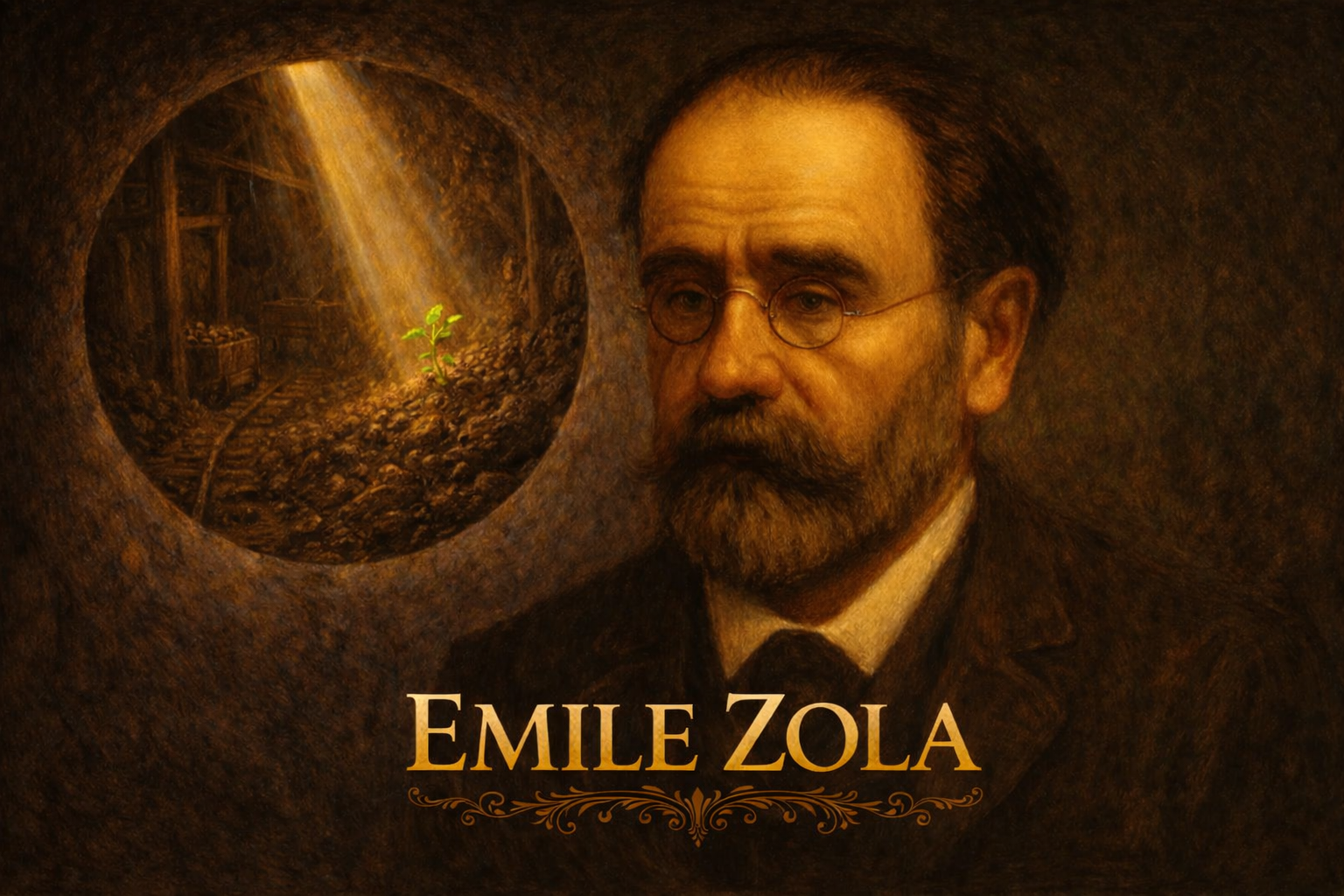TITLE: ÉMILE ZOLA
We tend to think of industry analysis as a numbers game; charts, forecasts and models. However markets aren’t moved by numbers alone. They’re shaped by human forces that don’t always show up on a spreadsheet.
Émile Zola understood this intuitively. Writing in 19th-century France, he used fiction to explore a variety of industries, from coal mining and retail to speculative finance.
Zola’s work is a reminder: behind every market trend is a deeper, human story.
Literary Naturalism
Émile Zola is best known for pioneering literary naturalism, a movement that explored how people’s actions are influenced by external forces, rather than purely by personal choice.
Influenced by the scientific thinking of his time, Zola approached fiction like a controlled experiment, placing his characters in specific conditions and observing how they responded to their environment.
Yet far from producing cold, mechanical portraits, Zola’s method ironically makes his characters feel more alive. They are compelling not because they rise above their world, but because they are bound to it, shaped by forces often unknown to them, yet visible to the reader. Unlike the abstract heroism of myths and legends, their behavior emerges from context: reactive, and constrained by the limits of their world.
This same dynamic plays out in business. However bold the strategy or visionary the leadership, companies remain tethered to their environments; to the broader economic climate and the industries they operate in.
The Story Beneath the System
Though set in 19th-century France, Zola’s work explores themes that remain relevant to modern finance and corporate strategy.
His novels examine the psychology behind greed, ambition, and appetite for risk, showing how those traits scale into social and economic systems.
What makes Zola’s work so resonant is that his stories reveal how these systems evolve. This is powerfully illustrated in Germinal, where he examines economic structures; where breakdowns occur, how power consolidates, and why meaningful transformation often takes place at the extremes.
Zola’s genius lies in showing that while systems may seem unpredictable, they follow recognizable patterns shaped by environmental pressures. Whether structural, social, or psychological, those forces build, often gradually, until resistance gives way.
His narratives reveal that even the most powerful institutions are ultimately shaped by human behavior, and over time, that behavior follows trajectories that make change not just likely, but inevitable.
Risk, Structure, and Meaning
Zola’s world, like today’s global markets, is shaped by the tension between chaos and control.
His stories remind us that while industries are constantly adapting to shifts in technology, markets, and regulation, their responses are rarely random. In fact, their decisions are often more predictable than they seem.
As Zola observed in his writing, behavior; whether individual or institutional, is shaped by deeper forces: environmental, social, and political. Industries, like people, tend to follow familiar patterns.
This connection between predictability and behavior offers a different perspective. It encourages us to look beyond the numbers and consider the broader forces that truly drive change across industries.
Signals Underground
For today’s business leaders, Émile Zola’s novel Germinal offers a timely perspective on how hidden pressures build and how fragile systems ultimately respond.
Set in a 19th-century coal mining town, Germinal reveals how industries built on low wages, rigid hierarchies, and deteriorating conditions can function in the short term but ultimately face a structural reckoning.
In its portrayal of the mining sector, Germinal explores the notion of brutal capitalism, where profitability depends on cheap labor and, at times, outright exploitation.
It also raises broader questions about the long-term viability of such industries and challenges the rationale of institutions that prioritize profit above all else.
Literature doesn’t offer straight-forward solutions in the way corporate policy or strategy might but it does sharpens the questions we ask. For leaders navigating their industries today, Germinal surfaces three critical ones:
-
What happens when workers are persistently undervalued?
-
What responsibility do leaders bear in the face of severe inequity?
-
How does a local disruption escalate into a broader collapse?
Zola’s answer is clear: when structural imbalances are left to compound, a course correction becomes only a matter of time.
An Executive Take
Today’s CFOs and CEOs play a far more active role than capital allocation, they are strategic thinkers responsible for guiding their organizations through complexity.
Their focus extends beyond isolated strategies; they understand that every decision today can trigger consequences that manifest themselves over years, even decades.
Émile Zola similarly believed that no action exists in a vacuum; that events and behaviors are shaped by a web of forces, each reaction tied to something deeper.
Today’s executives operate in much the same way, where the business landscape is less a playing field and more a chessboard, each move affecting many pieces in ways they can’t always see.
Forecasting Behavior
Amongst other things, these leaders are ultimately trying to forecast how people think: how investors will respond, how regulators will intervene, how markets might shift. That’s why, even as traditional models remain essential, there is space for more unconventional approaches.
The core challenge of finance is bringing structure to a system that is inherently chaotic. Similarly, literature seeks to make sense of complexity but goes further, offering a deeper view into the human motives that drive behavior. It helps us understand not just what is happening, but why it’s happening, and what might come next.
Zola wove this insight into his work. His narratives were exquisitely engineered, each detail and character exchange, chosen with intent, revealing the larger forces at play. He understood that chaos is rarely without cause; beneath disorder, there is often design, and that even the most violent disruptions follow hidden patterns.
Uncertainty, as Zola believed, is not random, it is a signal to be interpreted and ultimately understood. In essence, Zola’s work may be fictional but the insights it yields are unflinchingly real.
The Human Engine
In summary, understanding how industries behave requires more than crunching numbers, it demands tools that can capture the nuances of being human. Literature, particularly the work of French author Émile Zola, offers one such tool.
Zola meticulously constructed the characters in his novels, treating each one as a case study, examining the environmental and psychological forces that drive their actions. Businesses would benefit from the same level of scrutiny, looking beyond pure economics to explore the emotions, instincts, and ideas behind every decision.
His novels leave us with a clear reminder: while change may be measured in data, it is ultimately driven by people.
“You cannot suppress emotion. It is the driving force of history” — Anonymous
Personal Note: Why Germinal Stayed With Me
When I first read Émile Zola’s Germinal, I didn’t expect a 19th-century novel about coal miners to resonate so deeply, but it did; it was the raw humanity that lingered. Zola’s characters are flawed, impulsive, and often driven to extremes, which makes them all the more compelling.
In their struggle, I saw strength; a fierce belief in the right to a better life, and the courage to fight for it, even when the outcome was uncertain. Their fractured but growing conviction showed me how much bravery it takes to stand firm in what you believe, especially when the odds are stacked against you.
The title itself, Germinal, captures that spirit, symbolizing growth and regeneration. In its final line, Zola offers a powerful metaphor: seeds of revolution stirring underground, ready to break through toward the light. It’s a message that continues to speak to my fascination with transformation; that even the harshest struggles can become fertile ground, giving rise to hope, and, in time, to new beginnings.










